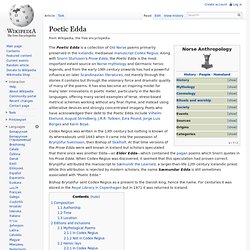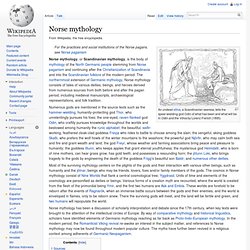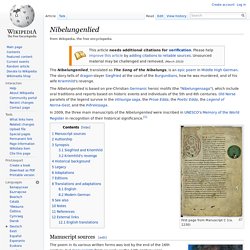

Poetic Edda. The Poetic Edda is a collection of Old Norse poems primarily preserved in the Icelandic mediaeval manuscript Codex Regius.

Along with Snorri Sturluson's Prose Edda, the Poetic Edda is the most important extant source on Norse mythology and Germanic heroic legends, and from the early 19th century onwards has had a powerful influence on later Scandinavian literatures, not merely through the stories it contains but through the visionary force and dramatic quality of many of the poems. It has also become an inspiring model for many later innovations in poetic meter, particularly in the Nordic languages, offering many varied examples of terse, stress-based metrical schemes working without any final rhyme, and instead using alliterative devices and strongly concentrated imagery.
Poets who have acknowledged their debt to the Poetic Edda include Vilhelm Ekelund, August Strindberg, J.R.R. Norse mythology. An undead völva, a Scandinavian seeress, tells the spear-wielding god Odin of what has been and what will be in Odin and the Völva by Lorenz Frølich (1895) For the practices and social institutions of the Norse pagans, see Norse paganism Norse mythology, or Scandinavian mythology, is the body of mythology of the North Germanic people stemming from Norse paganism and continuing after the Christianization of Scandinavia and into the Scandinavian folklore of the modern period.

The northernmost extension of Germanic mythology, Norse mythology consists of tales of various deities, beings, and heroes derived from numerous sources from both before and after the pagan period, including medieval manuscripts, archaeological representations, and folk tradition. Most of the surviving mythology centers on the plights of the gods and their interaction with various other beings, such as humanity and the jötnar, beings who may be friends, lovers, foes and/or family members of the gods. Sources[edit] Nibelungenlied. The Nibelungenlied, translated as The Song of the Nibelungs, is an epic poem in Middle High German.

The story tells of dragon-slayer Siegfried at the court of the Burgundians, how he was murdered, and of his wife Kriemhild's revenge. The Nibelungenlied is based on pre-Christian Germanic heroic motifs (the "Nibelungensaga"), which include oral traditions and reports based on historic events and individuals of the 5th and 6th centuries. Old Norse parallels of the legend survive in the Völsunga saga, the Prose Edda, the Poetic Edda, the Legend of Norna-Gest, and the Þiðrekssaga. In 2009, the three main manuscripts of the Nibelungenlied were inscribed in UNESCO's Memory of the World Register in recognition of their historical significance.[1]